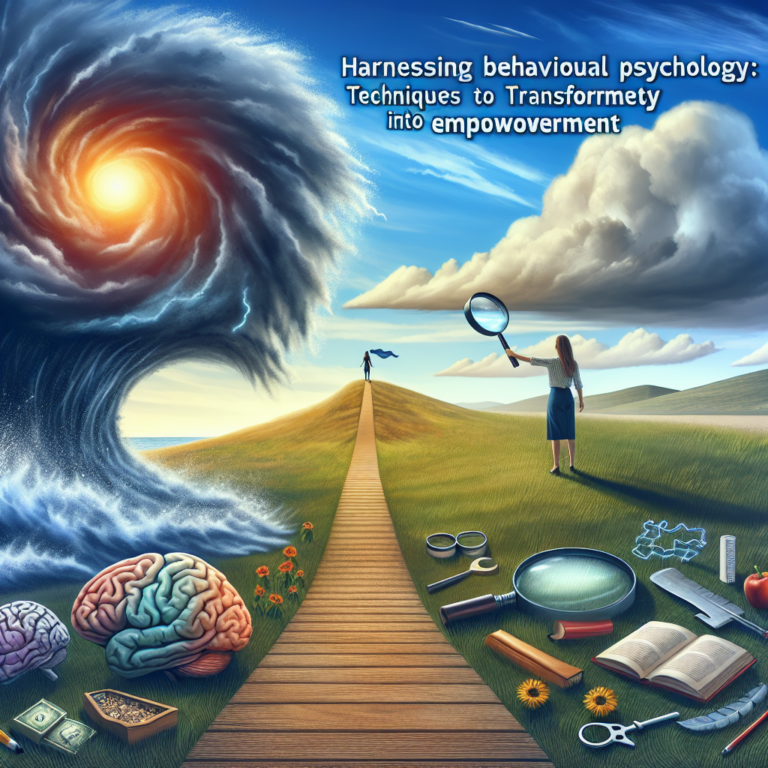
Breaking Free: Addiction through the Lens of Behavioral Psychology – Essential Insights and Proven Interventions
Introduction
In a world where the challenges posed by addiction continue to evolve, understanding this profound issue through the lens of behavioral psychology is not only essential but imperative. As societies grapple with the consequences of addiction—be it substance abuse, gambling, or even technology dependence—the insights offered by behavioral psychology shine a light on the mechanisms driving these destructive patterns. Addiction through the Lens of Behavioral Psychology: Insights and Interventions serves as a roadmap to not just comprehend the root causes of addiction, but to explore evidence-based interventions that can lead to recovery and empowerment.
Understanding Addiction: A Behavioral Perspective
The Behavioral Psychology Framework
Behavioral psychology, at its core, revolves around the understanding that all behaviors, including addiction, are learned and can be unlearned. This is grounded in two primary concepts:
Operant Conditioning:
- Behaviors are influenced by the consequences that follow them, be it reinforcement or punishment.
- Classical Conditioning:
- We learn through associations, where a neutral stimulus becomes associated with a significant event, leading to conditioned responses.
The Cycle of Addiction
Addiction often unfolds in a cycle: initial exposure leads to reinforcement, which creates habits that are increasingly difficult to break. This cycle can be understood better through behavioral psychology, enabling tailored interventions.
Case Study: The Tobacco Epidemic
Consider the Tobacco Epidemic, which highlights how the operant conditioning of smoking reinforces the habit through pleasurable sensations. This reinforcement often outweighs the negative consequences advertised by health campaigns. In understanding this, public health initiatives have adopted behavioral strategies, emphasizing support systems and quitting aids to amend these learned behaviors.
Analysis of the Case Study
The Tobacco Epidemic serves as a potent example of Addiction through the Lens of Behavioral Psychology: Insights and Interventions as it showcases the power of conditioned responses and the role of external stimuli in perpetuating addictive behaviors. By focusing on these behavioral patterns, public health campaigns have shifted towards more effective interventions, reinforcing the notion that understanding behavior can lead to meaningful change.
Root Causes of Addiction: Behavioral Triggers
Social and Environmental Factors
Addiction does not occur in isolation. The environment plays a significant role, with factors like peer influence, stress, and availability of substances acting as triggers.
- Table 1: Environmental Factors Influencing Addiction
| Factor | Description |
|---|---|
| Peer Pressure | Encouragement from friends or family to engage in addictive behavior. |
| Stress and Trauma | Life events that can drive individuals toward substance use for coping. |
| Availability | Accessibility of substances or addictive behaviors in one’s environment. |
Behavioral Interventions for Social Triggers
By modifying the environment, whether it be by avoiding certain social settings or utilizing support groups, individuals can mitigate these triggers. Behavioral strategies focus on creating supportive environments that challenge addictive behaviors.
Biological Considerations
While behavioral psychology holds the key to understanding many aspects of addiction, one cannot overlook the biological underpinnings—genetic predispositions play a significant role in how individuals respond to addiction.
Case Study: Opioid Use Disorder
The opioid crisis remains a significant public health challenge. Many individuals with a genetic predisposition to addiction find themselves caught in this web, underscoring the importance of early interventions.
Analysis of the Case Study
Evaluating opioid addiction through Addiction through the Lens of Behavioral Psychology: Insights and Interventions, we can understand the multifaceted nature of addiction. Here, a behavioral approach, combined with medical interventions, becomes crucial. Behavioral therapy addresses the psychological patterns while pharmacotherapy supports biological needs, illustrating the importance of an integrative approach.
Effective Interventions and Treatment Models
Cognitive Behavioral Therapy (CBT)
Cognitive Behavioral Therapy stands as a cornerstone of behavioral interventions. It focuses on altering negative patterns of thinking and behavior associated with addiction.
- Benefits of CBT:
- Identification and restructuring of harmful thoughts.
- Development of coping strategies and problem-solving skills.
Case Study: Successful CBT Application
A recent study in a rehabilitation center demonstrated that incorporating CBT reduced relapse rates among participants by 30%. This illustrates how addressing cognitive distortions through structured interventions has significant impacts on recovery.
Analysis of the CBT Case Study
The success of CBT in this case emphasizes that Addiction through the Lens of Behavioral Psychology: Insights and Interventions involves not just changing behavior, but also transforming thoughts that pave the way for relapse. This interplay between cognition and behavior underscores the essential role of interventions like CBT in comprehensive addiction treatment plans.
Motivational Interviewing
Motivational Interviewing (MI) is another powerful tool that helps individuals resolve ambivalence towards change. It effectively engages clients in their own recovery journey.
Table 2: Comparison of Traditional Counseling and MI
| Feature | Traditional Counseling | Motivational Interviewing |
|---|---|---|
| Directive Approach | Yes | No |
| Client Engagement | Moderate | High |
| Focus on Ambivalence | Low | High |
Case Study: MI in Practice
In a study featuring MI among adolescents in substance abuse programs, 40% reported improved motivation to change, showcasing MI’s effectiveness.
Analysis of the MI Case Study
The use of Addiction through the Lens of Behavioral Psychology: Insights and Interventions provides insight into how MI addresses core motivational issues. It recognizes that ambivalence itself is a barrier to change, thus illustrating the need for tailored interventions that resonate with individual experiences.
Building Resilience: Long-Term Strategies
Community and Support Systems
Social support plays a vital role in sustaining recovery. Building relationships within communities provides essential accountability and encouragement.
Relapse Prevention Strategies
Techniques such as identifying high-risk situations, developing coping skills, and fostering self-efficacy are essential in mitigating relapse risks.
Case Study: 12-Step Programs
Programs such as Alcoholics Anonymous (AA) utilize community and social support to aid recovery. Participants of AA have shown significant long-term recovery rates, further supporting the effectiveness of behavioral interventions within community contexts.
Analysis of the 12-Step Case Study
The applicability of Addiction through the Lens of Behavioral Psychology: Insights and Interventions in understanding the importance of support systems highlights how communal reinforcement can mitigate the impacts of addiction and promote lasting recovery.
Conclusion
Understanding addiction through the lens of behavioral psychology reveals the depth and complexity of this pervasive issue. From grasping the underlying psychological triggers to employing practical interventions, insights gained have the power to reshape treatment outcomes. Addiction through the Lens of Behavioral Psychology: Insights and Interventions not only empowers individuals affected by addiction but also focuses on the necessity of tailored strategies to facilitate meaningful change.
As awareness grows and innovative interventions unfold, the hope for recovery and resilience strengthens, reminding us that each step taken is a stride toward reclaiming a life free from the grips of addiction.
FAQs
1. What are the main types of addiction addressed by behavioral psychology?
Behavioral psychology focuses on various types of addiction, including substance abuse (alcohol, drugs), gambling, and technology-related habits. Each type represents unique triggers and requires tailored interventions.
2. How can behavioral interventions help in overcoming addiction?
Behavioral interventions aim to modify destructive patterns through approaches like Cognitive Behavioral Therapy (CBT) and Motivational Interviewing, helping individuals address thoughts, behaviors, and coping strategies associated with addiction.
3. What role does the environment play in addiction?
Environmental factors such as peer pressure, exposure to stress, and availability of substances significantly influence addiction patterns. Behavioral psychology seeks to modify these environments to mitigate risks.
4. Are there proven strategies for relapse prevention?
Yes, strategies such as identifying high-risk situations, developing coping skills, and utilizing support systems are essential components of effective relapse prevention strategies.
5. How can someone find support for addiction recovery?
Support can be found through community programs, counseling services, and peer support groups. Engaging in structured programs like 12-Step offerings can also provide a sense of community and accountability essential for recovery.
This comprehensive exploration of Addiction through the Lens of Behavioral Psychology: Insights and Interventions serves as both a guide and an inspiration for those seeking to understand and overcome addiction. Through actionable insights and validated strategies, the path to recovery beckons.

















